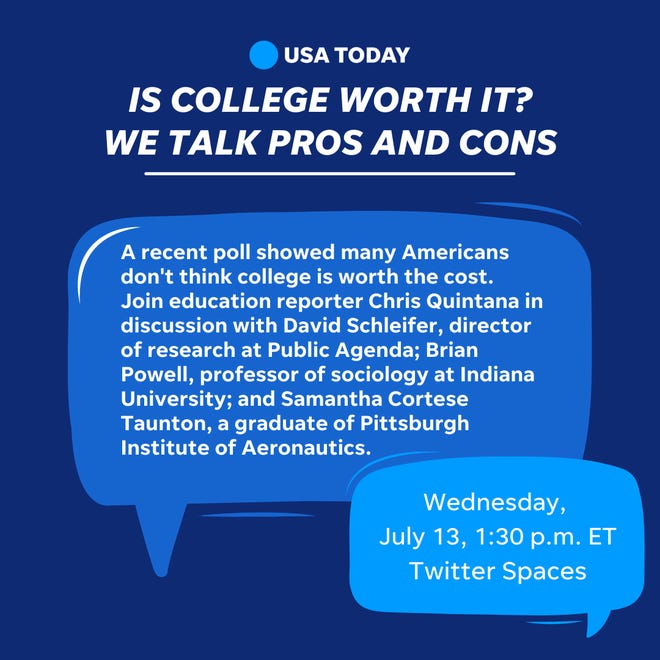How much do Americans value a degree?
Many Americans question the price and worth of a college or university training these days, in accordance to a new Usa Right now/General public Agenda Hidden Prevalent Ground poll. And of the several bigger education and learning options available, quite a few see a two-yr group school as a additional acceptable expense, according to the poll.
In conditions of a sheer charge comparison, it is challenging to argue with these knowledge.
The price tag of a bachelor’s degree program is generally considerably greater than that of an associate’s diploma or certification plan. In reality, it expenses practically 3 occasions as a great deal on regular to show up at a single 12 months at an in-point out 4-yr higher education, than it does to go to a community neighborhood college for the similar volume of time, in accordance to info from a College or university Board report.
And students frequently depart four-calendar year faculties with crippling quantities of debt. On average, public college or university students walk away with about $30,000 well worth of loans to pay back again, in accordance to the Education and learning Details Initiative.
Assist is accessible:Our psychological health crisis is receiving even worse. New 988 suicide hotline can be our fresh get started.
In overall, Americans have accrued extra than $1.7 trillion in college student debt in get to show up at four-12 months faculties, in accordance to the info selection team. And many of them are waiting around with anticipation as President Joe Biden considers whether to terminate at the very least a portion of federal college student financial loans.
So, higher education is also high-priced. But does that necessarily suggest the public thinks that faculty is not worthwhile?
College can mean greater success
For the past 10 years, Brian Powell and I (both sociology professors) have been conducting comparable interviews and surveys with the American public – more pointedly about the responsibility for the value of university.

We’ve asked more than 4,000 People in america beginning in 2010 (and each and every few years by means of 2020) who must shell out for college and whether higher training ought to be an unique fantastic, paid for primarily by mothers and fathers and college students, or a collective very good, paid for largely by the point out and federal governing administration. We have also talked to Individuals about what they feel of the expenditures in relation to the possible positive aspects.
I should have served:As an Asian bystander at an anti-Asian crime, why did I do absolutely nothing?
Most concur that achievements without having attending a four-year higher education is attainable. They regularly cite experienced trades this kind of as plumbers and electricians – employment that learners can educate for by value-helpful diploma or certification programs. In simple fact, just about all Americans concur (us incorporated) that it’s doable to get paid higher wages and have a excellent lifetime with no a bachelor’s degree.
At the exact same time, Individuals also identify that results is a lot extra likely with a bachelor’s diploma than devoid of one particular.
Browse more on poll:Is faculty truly worth it? Individuals say they value bigger schooling, but it is as well expensive for several
To the American public, “good” careers are significantly a lot more plentiful, and a lot easier to get, when learners have a 4-12 months faculty instruction. Good results among the those devoid of a bachelor’s diploma is observed as the exception. Good results among the people with a bachelor’s diploma, nonetheless, is generally found as the rule.
In our review, about two-thirds of Americans say college is worthy of the fiscal expense it involves.
Additional assistance for government to pay
Nevertheless, too generally, critiques of the superior price tag of 4-12 months colleges and universities are connected with phone calls to disinvest in higher instruction.
But most Us residents, according to our data, mostly have the opposite reaction.
Folks are a great deal far more probably to endorse government funding for bigger education and learning than they have been even a ten years back. There is also much much more assist for the idea of no cost tuition at public schools and universities.
Title IX:New Biden Title IX rules would use civil rights office…to strip civil rights from college students
In this feeling, most People see widespread governing administration guidance as the resolution to building college far more very affordable. Individuals as a complete imagine deeply in larger instruction and its capacity to enrich learners and communities.
People in america just want increased instruction and its several gains to come at a fair cost.
Natasha Quadlin is a UCLA affiliate professor of sociology. Brian Powell is James H. Rudy Professor of Sociology at Indiana College. They are the co-authors of “Who Need to Fork out?: Bigger Education and learning, Obligation, and the Community.”
Join Usa TODAY on Wednesday at 1:30 p.m. ET for a live Twitter Areas discussion on the charge of school.

